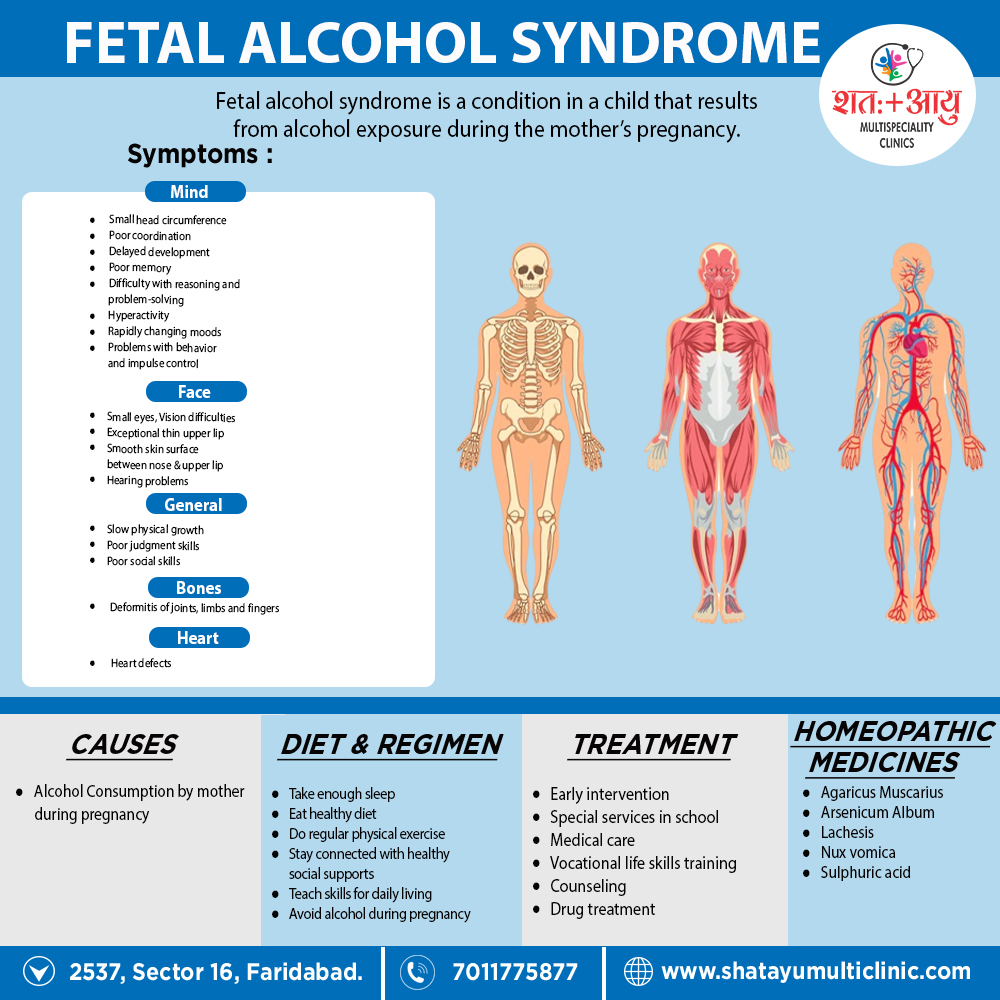Definition:
It is one type of condition in which occurs in a child that results from alcohol exposure during the mother’s pregnancy. [1]

It is one type of condition in which occurs in a child that results from alcohol exposure during the mother’s pregnancy. [1]
In fact, alcohol (beer, wine, or hard liquor) is the leading cause of preventable birth defects and developmental disabilities in the United States.
These disorders include a wide range of physical, behavioral, and learning problems. [2]
This syndrome causes brain damage and growth problems. The problems caused by fetal alcohol syndrome vary from child to child, but defects caused by fetal alcohol syndrome are not reversible.
Early diagnosis of this syndrome may help to reduce problems such as learning difficulties and behavioral issues. [1]
Based on studies of the Centers for Disease Control and Prevention and others, it is estimated that in the United States, somewhere between 800 and 8,000 babies could be born each year with FAS. [3]
Any amount of alcohol can harm a developing fetus and increase the risk of miscarriage.
Alcohol easily passes through the placenta, the organ that nourishes a baby during pregnancy.
Alcohol exposure during the first trimester; perhaps before a woman even knows she is pregnant can cause major birth defects.
Later in the pregnancy, drinking alcohol can cause poor growth and brain damage that could lead to learning and behavioral problems.
These problems can be prevented by not drinking any alcohol during pregnancy.
Do not drink if you are trying to get pregnant or think you may be pregnant. [2]
When you’re pregnant and you drink alcohol:
The more you drink while pregnant, the greater the risk to your unborn baby. However, any amount of alcohol puts your baby at risk. Your baby’s brain, heart and blood vessels begin to develop in the early weeks of pregnancy, before you may know you’re pregnant.
Impairment of facial features, the heart and other organs, including the bones, and the central nervous system may occur as a result of drinking alcohol during the first trimester. That’s when these parts of the fetus are in key stages of development. However, the risk is present at any time during pregnancy.
The more alcohol you drink during pregnancy, the greater the chance of problems in your baby. There’s no known safe amount of alcohol consumption during pregnancy.
You could put your baby at risk even before you realize you’re pregnant.
Don’t drink alcohol if:
Clinical features of this syndrome may include any mix of physical defects, intellectual or cognitive disabilities, and problems functioning and coping with daily life.
It can be difficult to diagnose fetal alcohol syndrome. There isn’t a direct test for FAS and pregnant people may not give a complete history of all alcohol intake during pregnancy.
Pediatric providers can often make a diagnosis of FAS based on the size of a child, specific physical signs and symptoms that develop through childhood, including:
Symptoms of FAS can resemble those found in other disorders, including:
Fetal alcohol syndrome isn’t curable, and the symptoms will impact your child throughout life.
However, early treatment of some symptoms can lessen the severity and improve your child’s development.
Treatment options can include:
Parental training is meant to help parents to help families cope with behavioral, educational and social challenges.
Parents might learn different routines and rules that can help their child adapt to different situations.
Often, having a stable and supportive home can help children with FAS avoid developing mental and emotional difficulties as they get older.
There are also certain “protective factors” that help reduce the negative impact of FAS on a child. These factors can include:
Problem behaviors not present at birth that can result from having fetal alcohol syndrome (secondary disabilities) may include:
Experts know that fetal alcohol syndrome is completely preventable if women don’t drink alcohol at all during pregnancy.
These guidelines can help prevent fetal alcohol syndrome:
Homeopathy treats the person as a whole. It means that homeopathic treatment focuses on the patient as a person, as well as his pathological condition. The homeopathic medicines selected after a full individualizing examination and case-analysis.
Which includes
A miasmatic tendency (predisposition/susceptibility) also often taken into account for the treatment of chronic conditions.
A homeopathy doctor tries to treat more than just the presenting symptoms. The focus is usually on what caused the disease condition? Why ‘this patient’ is sick ‘this way’?
The disease diagnosis is important but in homeopathy, the cause of disease not just probed to the level of bacteria and viruses. Other factors like mental, emotional and physical stress that could predispose a person to illness also looked for. Now a days, even modern medicine also considers a large number of diseases as psychosomatic. The correct homeopathy remedy tries to correct this disease predisposition.
The focus is not on curing the disease but to cure the person who is sick, to restore the health. If a disease pathology not very advanced, homeopathy remedies do give a hope for cure but even in incurable cases, the quality of life can greatly improve with homeopathic medicines.
The homeopathic remedies (medicines) given below indicate the therapeutic affinity but this is not a complete and definite guide to the homeopathy treatment of this condition. The symptoms listed against each homeopathic remedy may not be directly related to this disease because in homeopathy general symptoms and constitutional indications also taken into account for selecting a remedy, potency and repetition of dose by Homeopathic doctor.
So, here we describe homeopathic medicine only for reference and education purpose. Do not take medicines without consulting registered homeopathic doctor (BHMS or M.D. Homeopath).
Opium
References: